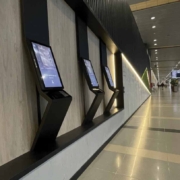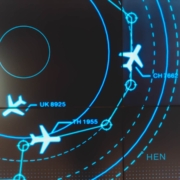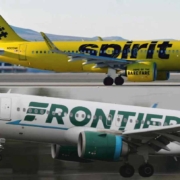The aviation market with blockchain technology is experiencing remarkable growth, according to the latest report by SNS Insider. This market, which is already part of various sectors of the aviation industry, might grow more than fourfold between 2023 and 2030, reaching $3,829 million by the year 2030, with a compound annual growth rate (CAGR) of 22.2%.
How does blockchain technology impact aviation? It is being adopted by airlines in various aspects, from digital infrastructure to tracking information about aircraft design. This widespread use is driving significant growth in the industry as airlines seek to improve operational efficiency and offer new experiences to their customers.
Blockchain Technology in Aviation and Operational Efficiency

Image from Freepik
Blockchain technology is changing how to transfer benefits to providers operating integrated functions on aircraft. Additionally, smart contracts enable automated agreements that execute themselves, eliminating the need for intermediaries and opening new opportunities for asset tokenization, such as aircraft and airport infrastructure.
What is Tokenization in the Context of Blockchain?
Tokenization is a process whereby a physical or digital asset is represented as a digital token on a blockchain. These tokens can represent a wide range of assets, from currencies and stocks to real estate and, in the case of the aviation industry, even aircraft and flight rights. Tokenization allows to divide assets into smaller parts, facilitating fractional investment and the transfer of ownership efficiently and transparently.
Benefits of Blockchain Technology in Aviation
Transparency and Security

Image from Freepik
Blockchain provides an immutable and transparent record of all transactions, increasing trust and security in air operations. Data stored on the blockchain is immutable and protected through cryptography, reducing the risk of fraud and data manipulation.
Asset Tokenization
The tokenization of aeronautical assets, such as aircraft and flight rights, can democratize access to investment in the industry. Investors can acquire fractions of assets through digital tokens, allowing them to diversify their portfolios and access previously inaccessible investment opportunities.
Supply Chain Management
Blockchain can improve traceability and supply chain management in the aviation industry, enabling precise tracking of components and materials from their origin to their final destination. This can help prevent counterfeiting and improve efficiency in inventory and spare parts management.
Investment Opportunities

Image from Freepik
Collaborations between industry players and technology providers are driving greater innovation and market growth. Airlines can invest in fractional ownership, enhance their blockchain-based loyalty programs, and optimize the passenger identity system to improve customer engagement.
Leading companies such as IBM, Microsoft, Moog, and Sweetbridge are dominating the blockchain market in aviation, with a prominent presence in the United States and Asia. These companies can play a key role in driving growth and innovation in the aviation industry in the coming years.
Challenges and Future Perspectives
While the aviation market with blockchain technology is experiencing rapid growth, it still faces challenges such as slow integration and reluctance to change by some companies. However, blockchain use in aviation can continue expanding in regions such as Africa, the Middle East, and Latin America, where it can experience a significant increase in adoption.
As we continue moving towards the future, companies and industry players should be prepared to adapt and make the most of the opportunities that blockchain offers. With a focus on collaboration, innovation, and strategic adoption of technology, the aviation industry can thrive in the digital era.
For more insights about the aeronautics industry, visit our website.




 https://aviationweek.com/air-transport/safety-ops-regulation/ge-aviation-albany-airport-launch-covid-19-tracking-app
https://aviationweek.com/air-transport/safety-ops-regulation/ge-aviation-albany-airport-launch-covid-19-tracking-app 






Leave a Reply
Want to join the discussion?Feel free to contribute!